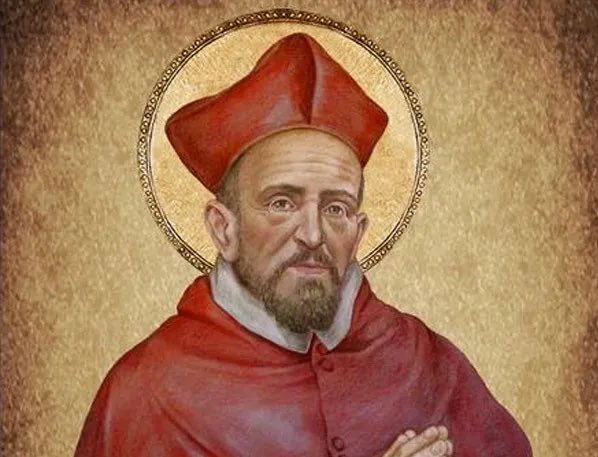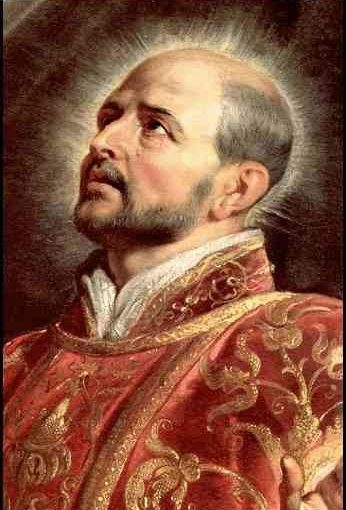Category: Jesuit saints & blesseds
St Ignatius of Loyola
“God freely created us so that we might know, love, and serve him in this life and be happy with him forever. God’s purpose in creating us is to draw forth from us a response of love and service here on earth, so that we may attain our goal of everlasting happiness with him in heaven. All the things in this world are gifts of God, created for us, to be the means by which we can come to know him better, love him more surely, and serve him more faithfully.”
—St. Ignatius Loyola
St. Edmund Campion and his companions
The Church liturgically recalls the memory of the great and holy English martyrs of the Venerable English College in Rome. The Jesuit Saint Edmund and 43 others is rather striking because of the intimate connection to the Roman seminary situated to form English Catholic priests. This was the time of Queen Elizabeth I’s reign and the height of Catholic persecution. Today is known by many as Martyrs’ Day.
That forty-four men who were executed, tortured, or incarcerated for giving good witness, that is, ministering the Catholic faith to their own people in England. One of Campion is remembered for what is called “Campion’s Brag,” his clear and undisputed defense of the Catholic faith. He noted that his mission was to “justify the said faith by the common wisdom of the laws standing yet in force and practice” concluding that “The expense is reckoned, the enterprise is begun; it is of God; it cannot be withstood. So the faith was planted: So it must be restored.”
The “Second Apostle of Rome,” St. Philip Neri, living opposite the English College used to greet the students with the words Salvete Flores Martyrum (Hail! flowers of the Martyrs).
The grace we ask St. Edmund Campion and his companions to secure for us is to abide in, to be attuned to, the truth of the Catholic Faith.
St Francis Xavier
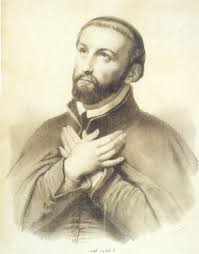 Francis Xavier has always held a special place in my heart. Being on mission is a singular grace given to for the sake of the Kingdom.
Francis Xavier has always held a special place in my heart. Being on mission is a singular grace given to for the sake of the Kingdom.
One of his biographers, Fr. Georg Schurhammer, SJ, has a 3 volume biography of Xavier that is quite moving and beautiful. Without exaggeration he is the greatest missionary Christianity has ever seen outside of St. Paul the Apostle. As the collect of his Mass says below, may we all be gifted with the zeal for the faith that he had!
“O God, who through the preaching of Saint Francis Xavier won many peoples to yourself, grant that the hearts of the faithful may burn with the same zeal for the faith and that Holy Church may everywhere rejoice in an abundance of offspring. Through our Lord Jesus Christ, your Son, who lives and reigns with you in the unity of the Holy Spirit, one God, for ever and ever.”
St Alphonse Rodriguez
 Among many saints and blesseds liturgically honored today (e.g., Saint Wolfgang & Blessed Theodore Romzha), we have the feast of the Jesuit Saint Alphonse Rodriguez, known for his extraordinary holiness that shone out of his ordinary work as the doorkeeper of a Jesuit school. Tremendous opportunities for holiness in the ordinary.
Among many saints and blesseds liturgically honored today (e.g., Saint Wolfgang & Blessed Theodore Romzha), we have the feast of the Jesuit Saint Alphonse Rodriguez, known for his extraordinary holiness that shone out of his ordinary work as the doorkeeper of a Jesuit school. Tremendous opportunities for holiness in the ordinary.
Why is Rodriquez’s feast so important? Because in him I see how Grace expanded the horizon of a person’s humanity shining the love of the Savior. He met the high and low at the door as the Lord wanted: with love and dignity. Plus, many thought that a laybrother of the Society of Jesus and a man with a very humble assignment of doorkeeper could be a saint; he produced no summa, no great record of baptizing or being martyred in a far away land. By the way, the Capuchins have several saints who were doorkeepers and we also have the noteworthy Saint André Bessette, a Brother of Holy Cross. Many times, I believe, the laybrothers are supreme witnesses to Christ and the promise of salvation; religious brothers show the Hundredfold as realizable.
What is memorable of Alphonse is a poem written by the Jesuit poet Gerard Manley Hopkins, number 49:
HONOUR is flashed off exploit, so we say;
And those strokes once that gashed flesh or galled shield
Should tongue that time now, trumpet now that field,
And, on the fighter, forge his glorious day.
On Christ they do and on the martyr may;
But be the war within, the brand we wield
Unseen, the heroic breast not outward-steeled,
Earth hears no hurtle then from fiercest fray.
Yet God (that hews mountain and continent,
Earth, all, out; who, with trickling increment,
Veins violets and tall trees makes more and more)
Could crowd career with conquest while there went
Those years and years by of world without event
That in Majorca Alfonso watched the door.
If you don’t know St. Alphonse, do yourself a favor and look up his biography.
St Peter Canisius
 Lord, you gave Saint Peter Canisius wisdom and courage to defend the Catholic faith. By the help of his prayers may all who seek the truth rejoice in finding you, and may all who believe in you be loyal in professing their faith.
Lord, you gave Saint Peter Canisius wisdom and courage to defend the Catholic faith. By the help of his prayers may all who seek the truth rejoice in finding you, and may all who believe in you be loyal in professing their faith.
“Have you read you Canisius today,” was the question school kids would ask each other referring to reading the catechetical texts composed by Fr Peter Canisius. His catechetical writings focussed on the Liturgy and the sacraments. The hallmark of Canisius and then his writings was his profound personal friendship with Jesus.
While we don’t use the saint’s catechism today, at least not in the USA, the question remains the pertinent to us –have we studied our catechism today?
Read Pope Benedict XVI’s 2011 brief biography on Canisius can be read here.
St Robert Bellarmine
The 17th century Jesuit, Saint Robert Bellarmine (+1642) is liturgically recalled today. He was a very competent theologian and who took on Protestant heresy. One aspect of Bellarmine’s teaching was his insistence on obedience to the Church and her teachings. These were days in which a Jesuit’s obedience was clear and decisive. You can say that Bellarmine was in medio ecclesiae—in the midst of the Church, right where Christ placed us. One’s obedience to the Church was in contradistinction to the Protestant method. The obedience Bellarmine advocated was not blind; he fostered study, scrutiny and understanding the Church’s “difficult teachings.” Study, scrutiny and understand keeps the head and body together: it’s impossible to sever Christ from the Church.
Robert Bellarmine: Jesuit, priest, bishop, cardinal, Doctor of the Church, pray for us.
St Ignatius of Loyola
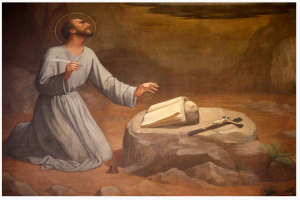 “God freely created us so that we might know, love, and serve him in this life and be happy with him forever. God’s purpose in creating us is to draw forth from us a response of love and service here on earth, so that we may attain our goal of everlasting happiness with him in heaven. All the things in this world are gifts of God, created for us, to be the means by which we can come to know him better, love him more surely, and serve him more faithfully. As a result, we ought to appreciate and use these gifts of God insofar as they help us toward our goal of loving service and union with God. But insofar as any created things hinder our progress toward our goal, we ought to let them go.” ― Ignatius of Loyola
“God freely created us so that we might know, love, and serve him in this life and be happy with him forever. God’s purpose in creating us is to draw forth from us a response of love and service here on earth, so that we may attain our goal of everlasting happiness with him in heaven. All the things in this world are gifts of God, created for us, to be the means by which we can come to know him better, love him more surely, and serve him more faithfully. As a result, we ought to appreciate and use these gifts of God insofar as they help us toward our goal of loving service and union with God. But insofar as any created things hinder our progress toward our goal, we ought to let them go.” ― Ignatius of Loyola
St Ignatius of Loyola
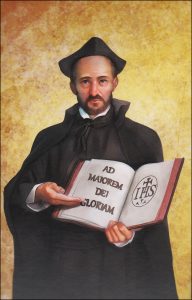 Today is the liturgical memorial of one of the most influential saints of the 16th century, Saint Ignatius of Loyola. His clarity of thought, his discernment of Spirits and determination to serve the Lord in everything is what set the world on fire with a new charism.
Today is the liturgical memorial of one of the most influential saints of the 16th century, Saint Ignatius of Loyola. His clarity of thought, his discernment of Spirits and determination to serve the Lord in everything is what set the world on fire with a new charism.
Our moment-to-moment task is to keep the Divine Name on our lips “His Name is like fire burning in my heart” (see Jeremiah 20:8), we ought to do everything to serve and love. By no other name are saved but Jesus’.
The Spiritual Exercises are a great gift to the Church; his rules of discernment, contemplation on Divine Love, and thinking with the Church are key to the spiritual life.
In the 16the century Loyola wanted to serve the Lord in model of Saint Dominic and Saint Francis; what ended up happening was a renewal in the manner by which the Church is apostolic — and he (and his spiritual sons had great success until the 1960s. Today, mentioning the word Jesuit is to say “I follow a left-leaning agenda.” One can think of various theologians, philosophers, writers and pastoral ministers who are ordained and professed members of the Society of Jesus. The disasters in ministry, hence, orchestrated by the Jesuits has been scandalous.
We need Loyola and the true beauty of the Society of Jesus; we need real men; we need men who will sacrifice themselves for the greater glory of God; we need Jesuits who will preach the received Gospel and to administer the sacraments according the to mind and heart of the Church. What we don’t need is the faithless Jesuits who do not think with the Church and follow closely what their sainted founder (and the patrimony of saints and blesseds) set out to do for Christ Jesus and His Church.
Saint Ignatius Loyola, pray for us!
St Aloysius Gonzaga: lived and died with the Holy Name on his lips
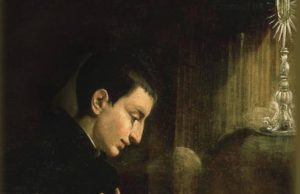 Saint Aloysius is admirable for several reasons –two come to mind. The first is reflected here:
Saint Aloysius is admirable for several reasons –two come to mind. The first is reflected here:
“He was baptized in the womb because his life was in danger. He received his First Holy Communion from Saint Charles Borromeo. At age nine he vowed virginity, and in spite of temptations of the princely courts his first innocence was sustained. He died in 1591, age 23, as a result of his devoted nursing of the plague-victims” (Daily Missal).
AND, then it is recorded that the last word he spoke was the Holy Name of Jesus.
Saint Aloysius Gonzaga, patron and model of youth, pray for us.
